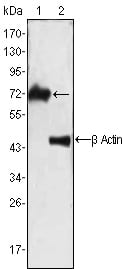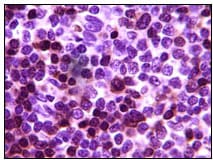

| WB | 1/500 - 1/2000 | Human,Mouse,Rat |
| IF | 咨询技术 | Human,Mouse,Rat |
| IHC | 1/200 - 1/1000 | Human,Mouse,Rat |
| ICC | 技术咨询 | Human,Mouse,Rat |
| FCM | 咨询技术 | Human,Mouse,Rat |
| Elisa | 1/10000 | Human,Mouse,Rat |
| Aliases | SRK; STD; TZK |
| Entrez GeneID | 7535 |
| clone | 3D2A4 |
| WB Predicted band size | 70kDa |
| Host/Isotype | Mouse IgG1 |
| Antibody Type | Primary antibody |
| Storage | Store at 4°C short term. Aliquot and store at -20°C long term. Avoid freeze/thaw cycles. |
| Species Reactivity | Human |
| Immunogen | Purified recombinant fragment of human ZAP70 expressed in E. Coli. |
| Formulation | Purified antibody in PBS with 0.05% sodium azide. |
+ +
以下是3篇关于ZAP70抗体的代表性文献(信息基于公开研究整理,部分年份或作者可能存在更新):
---
1. **文献名称**:*ZAP-70: a novel prognostic marker in chronic lymphocytic leukemia*
**作者**:Rassenti LZ, et al.
**摘要**:该研究首次提出ZAP70抗体检测可作为慢性淋巴细胞白血病(CLL)的预后标志物。研究发现,ZAP70阳性患者比阴性患者疾病进展更快,生存期更短,提示其与B细胞受体信号异常激活相关。
---
2. **文献名称**:*ZAP-70 enhances B-cell receptor signaling despite absent or inefficient tyrosine kinase activation*
**作者**:Chen L, et al.
**摘要**:通过ZAP70抗体阻断实验,揭示了ZAP70在B细胞受体信号传导中的非典型作用机制。研究表明,即使缺乏典型酪氨酸激酶活性,ZAP70仍能通过蛋白互作增强下游信号,影响免疫细胞功能。
---
3. **文献名称**:*ZAP70 deficiency in humans results in a block in early T-cell receptor signaling*
**作者**:Chan AC, et al.
**摘要**:利用ZAP70抗体进行免疫印迹分析,发现ZAP70基因缺陷患者的T细胞受体(TCR)信号传导受阻,导致严重联合免疫缺陷(SCID)。该研究阐明了ZAP70在T细胞发育中的关键作用。
---
**注**:如需具体文献DOI或引用格式,建议通过PubMed或学术数据库检索最新研究。
ZAP-70 (zeta-chain-associated protein kinase 70) is a cytoplasmic tyrosine kinase critical for T-cell receptor (TCR) signaling and immune response regulation. It belongs to the Syk family of kinases and is primarily expressed in T cells and natural killer (NK) cells. Upon TCR activation, ZAP-70 is recruited to phosphorylated immunoreceptor tyrosine-based activation motifs (ITAMs) on the CD3ζ chain, initiating downstream signaling cascades that drive T-cell activation, proliferation, and differentiation. Deficiencies in ZAP-70 function are linked to severe combined immunodeficiency (SCID), underscoring its essential role in adaptive immunity.
ZAP-70 antibodies are widely used in research and diagnostics to study protein expression, localization, and signaling mechanisms. In clinical settings, ZAP-70 detection via flow cytometry or immunohistochemistry serves as a prognostic biomarker in chronic lymphocytic leukemia (CLL). High ZAP-70 expression in CLL patients correlates with aggressive disease, unmutated immunoglobulin heavy-chain genes, and poorer outcomes, mirroring CD38 positivity. Additionally, ZAP-70 antibodies aid in characterizing immune dysregulation in autoimmune disorders and immunodeficiency syndromes. Recent studies also explore its potential as a therapeutic target, given its involvement in pathological T-cell activation. Overall, ZAP-70 antibodies are vital tools for unraveling immune system dynamics and improving disease management strategies.
×